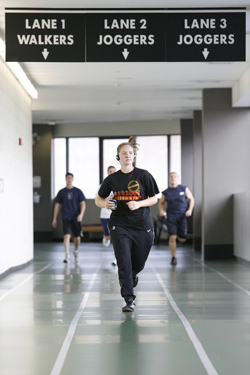How much are you really exercising?
|
People struggling with obesity often underestimate how many calories they are actually consuming, which can hinder weight loss efforts. It should follow that the same person would overestimate the amount of exercise they’re doing, right?
“The ability to estimate the amount of minutes engaged in physical activity is a difficult task for many, however the accuracy of this estimate can increase with education and participation in physical activity over time,” said Oliver.At the first measurement, and a second three months later, obese women most accurately reported the amount of physical activity they were getting. But at 12 months, all three groups were reporting on their activity levels more accurately.
—Written by Eryn Jelesiewicz |
 Photo by Ryan S. Brandenberg/Temple University
In a study to be presented at The Obesity Society's annual meeting, CORE's Tracy Oliver found that obese women reported their activity levels most accurately, when compared to overweight and normal weight women.
|